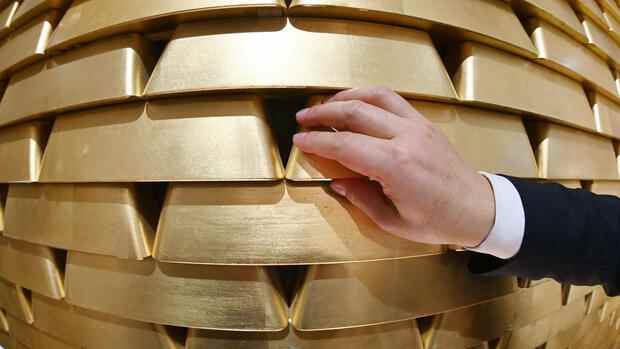Processing into jewelery or remelting into investment bars for retail customers does not violate the new EU sanctions.
(Photo: dpa)
Zurich, Brussels The 27 EU member states want to decide on an import ban for Russian gold on Wednesday. In doing so, they are implementing a decision made at the recent G7 summit. The other partners USA, Great Britain, Canada and Japan have already imposed a gold embargo.
Like other sanctions, for example in the energy sector, the embargo has loopholes. According to the draft resolution of the EU Commission, the “direct or indirect import, purchase or transfer” of gold from Russia should be prohibited. An appendix specifies which forms of gold are affected and which are not.
Unprocessed gold and gold coins are subject to the ban, but not gold jewellery. Also, the import ban only extends to newly mined and refined gold. However, Russian gold that is already on the market can continue to be traded.
With these restrictions, the EU falls short of the London Bullion Markets Association’s (LBMA) voluntary industry commitment. The LBMA has effectively banned Russian gold produced after the March 7 deadline from international wholesale gold trading.
Top jobs of the day
Find the best jobs now and
be notified by email.
Russian gold refineries have been removed from the so-called Good Deliveries List to prevent the bars from going to gold vaults in London.
Gold is an important supplier of foreign exchange
With 330 tons per year, Russia is the second largest gold producer after China. This corresponds to ten percent of global mine production. After energy commodities, the precious metal is the country’s most important export good and thus an important supplier of foreign exchange. Last year, Russian gold exports totaled $17.4 billion. Most of the gold was shipped to London before the outbreak of war.
Industry experts now assume that the gold shipments have been diverted, for example to China or India, countries that do not sanction Russia. The impact on the gold price and the availability of the precious metal is therefore small.
Nevertheless, the EU Commission’s decision helps to eliminate legal uncertainty in the gold trade. Because Switzerland is likely to accept the sanctions one-to-one, just like the previous packages. The country is the global center for processing gold. According to industry estimates, between 40 and 70 percent of the gold mined worldwide is processed in Switzerland into gold bars or semi-finished products for the watch and jewelry industry.
As it became known on Tuesday, Switzerland imported around 278 kilograms of Russian gold in June that had previously been stored in vaults in London. In May it had been three tons. Who is behind the transactions is unknown.
>> Also read here: The Weapons of Global Economic War: How the West Fell into Putin’s Trap
The handling of Russian gold has triggered a debate in the Swiss gold industry. The Swiss Association of Precious Metal Manufacturers (ASFCMP) had emphasized “that risky gold has no place in Switzerland and that it expects its members to act with extreme caution and, if in doubt, to refrain from doing so”.
One problem remains: How to deal with newly produced gold?
The industry association, whose members process 90 percent of the gold imported into Switzerland, further stated: “Any risk of participating in the war effort by buying Russian gold cannot be accepted by the ASFCMP and its members.”
The Swiss Precious Metals Institute (SPMI), a newly formed industry association, said in a statement that Swiss law does not prohibit the import and processing of Russian gold produced after March 7. The SPMI therefore called on the Swiss government to eliminate this legal uncertainty.
>> Also read here: Large Swiss refinery wants to explain to customs that it can continue to process gold from Russia
With the adoption of the EU sanctions, this discussion should have been settled – especially since the companies represented by the Swiss Association of Precious Metal Manufacturers, such as Argor-Heraeus, Valcambi or Metalor, according to their own statements, refrain from accepting Russian gold that was produced after the outbreak of the war .
However, even the gold embargo does not solve the problem of how to deal with relatively newly produced gold from Russia. The fact that Russia’s President Vladimir Putin was ahead of the West with his war plans can also be seen on the gold market: industry insiders unanimously report that large quantities of Russian gold were sold on the London trading center in the months before the war broke out.
Refineries that ordered gold for physical delivery in London during this period in order to make jewelry or bars from it were surprised that they received large quantities of Russian material from the British capital. In hindsight, gold industry executives explain that Russia sold a lot of gold in anticipation of sanctions before attacking Ukraine.
But how should the industry deal with these bars? Processing into jewelry or remelting into investment bars for retail customers does not violate sanctions. At the same time, there is little doubt that some of this gold was used to finance the war of aggression against Ukraine. In order to rule out war financing, the company Argor-Heraeus, for example, no longer accepts gold from companies or private individuals with connections to Russia – not even gold exported from Russia after the outbreak of war.
There are still some countries that do not sanction the export of Russian gold. Gold in these countries could be processed into jewelry and potentially end up in the Western value chain.
More: Russian oligarchs sue EU sanctions

